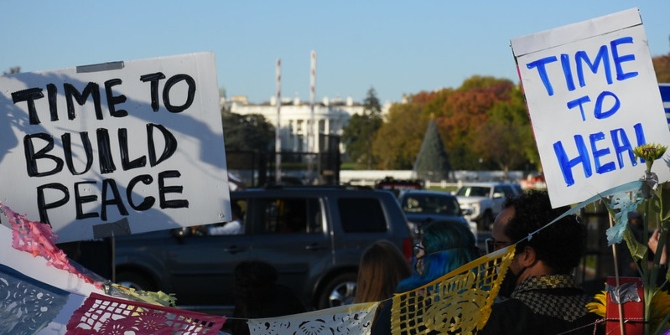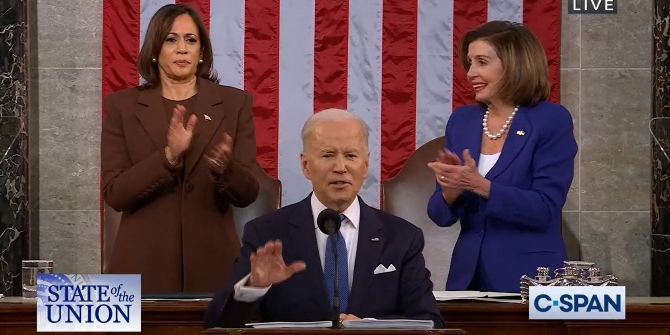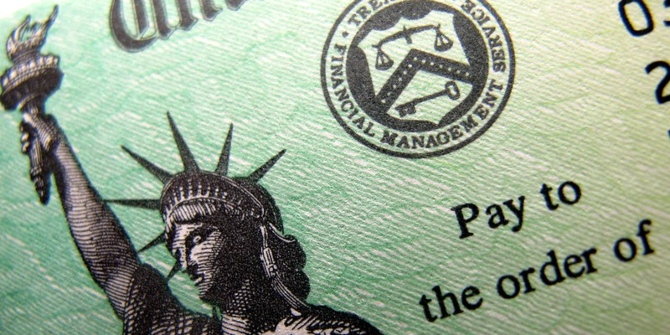 President Trump has been criticised increasingly for his response to the COVID-19 pandemic, which has seen the US become one of the worst affected countries. In this Q&A, Thomas Gift explains that Donald Trump has reason to be concerned about his flagging campaign and low poll numbers. At the same time, the 2020 race for the White House is far from over, and Trump’s Democratic challenger, former Vice President Joe Biden, shouldn’t view his current lead as insurmountable.
President Trump has been criticised increasingly for his response to the COVID-19 pandemic, which has seen the US become one of the worst affected countries. In this Q&A, Thomas Gift explains that Donald Trump has reason to be concerned about his flagging campaign and low poll numbers. At the same time, the 2020 race for the White House is far from over, and Trump’s Democratic challenger, former Vice President Joe Biden, shouldn’t view his current lead as insurmountable.
Trump recently claimed that polls showing him trailing Joe Biden are inaccurate and that they systematically underestimate his support. Given that his victory in 2016 did surprise most experts, could there any merit to these claims?
Trump often insists, without evidence, that he has internal poll numbers showing him doing much better than experts predict. Yet it’s not just the topline numbers—with Trump trailing Biden by over 8 percentage points, according to Real Clear Politics—that should worry him. A recent NBC News/Wall Street Journal poll, for example, finds that 72 percent of US voters think the country is moving in the wrong direction. That’s a striking figure. Other polling from Quinnipiac reveals that Trump’s ability to monopolize large majorities of reliable Republican demographics—such as whites lacking college degrees—is also receding. Still, it’s premature to say this race is even close to over. In the last presidential contest, Hillary Clinton was up by nearly 8 percentage points in August of 2016—that’s even closer to that year’s election than we are now in 2020. So these races often tighten up.
COVID-19 cases have surged in the United States of late, topping 75,000 new infections for the first last week. With the White House under increasing criticism, is Trump now competing primarily against the virus or Joe Biden?
Trump is trying to make the race about Biden, but to a large extent, his main competitor is the coronavirus. If the US doesn’t turn the corner on COVID-19, it’s hard to envision the president compensating for that failure. Trump, however, seems increasingly to be ignoring the pandemic in his political communications. For example, he suspended the White House taskforce briefings on COVID-19 for three months from April, and he rarely mentions the coronavirus in high-profile events. When Trump talks about COVID-19, he largely describes an optimism about curbing the virus that doesn’t square with the depressing data released by the Centers for Disease Control. The 2020 election will most likely be a referendum on the president’s record. The White House’s failure to get COVID-19 under control is central to that record, and it’s clearly pulling down Trump’s favorabilities.
One of Trump’s key selling points to Americans before the coronavirus outbreak was that he was presiding over a strong economy. Can the US economy recover in time for Trump to take advantage of it in the 2020 election?
The health of the economy is closely linked to what happens with COVID-19. Although the stock market remains buoyant, it’s unlikely that we’ll see a sharp v-shaped recovery on most economic indicators by election day. That’s especially true if more states close businesses, schools, and other enterprises as COVID-19 surges. The nonpartisan Congressional Budget Office estimated that US unemployment would finish the year at 10.5 percent. That’s about 7 percentage points higher than before the pandemic. JPMorgan also predicted that GDP will shrink by 6.2 percent in the fourth quarter compared to last year. A recent Fox News poll even found that more American voters trust Biden over Trump on the economy by a thin margin. That’s very bad news for president, who—for all the criticism directed at him—has generally received high marks on his handling of the economy.
Last week, Trump demoted and replaced his campaign manager. Yet he continues to insist he’s doing great in his campaign. Is this evidence that the president is worried about his re-election chances, or should we not read too much into this?
No doubt, this is a major shake-up within the Trump campaign. But then again, Trump has been notorious within his own administration for routinely dismissing top-level officials, so maybe it’s not too surprising that he opted for a change. The move to replace Brad Parscale with Bill Stepien, who was Trump’s deputy campaign manager, represents a few things. First, Trump clearly lost confidence in Parscale, who was often criticized for putting the limelight on himself. Second, Trump likely just thinks that he needs a change at the top, which can help get him back on track, restore his poll numbers, and reinvigorate his flagging campaign. Finally, Stepien is known for a relentlessly data-driven approach. As the Republican Party increasingly tries to modernize and to exploit big data to guide its electoral strategies, Trump obviously sees huge value in this skillset.
- These remarks are based in part on an interview by Thomas Gift on CNBC Europe on July 20, 2020.
- Featured image ‘President Trump Participates in a Briefing‘ by The White House is Public Domain.
Please read our comments policy before commenting.
Note: This article gives the views of the author, and not the position of USAPP – American Politics and Policy, nor the London School of Economics.
Shortened URL for this post: https://bit.ly/2ZRIW5E
About the author
 Thomas Gift – University College London
Thomas Gift – University College London
Thomas Gift is a Lecturer of Political Science at UCL, where he teaches on Public Policy Economics and Analysis and is the Director of the Philosophy, Politics, and Economics (PPE) Programme. He is also a Visiting Fellow at the LSE US Centre.






